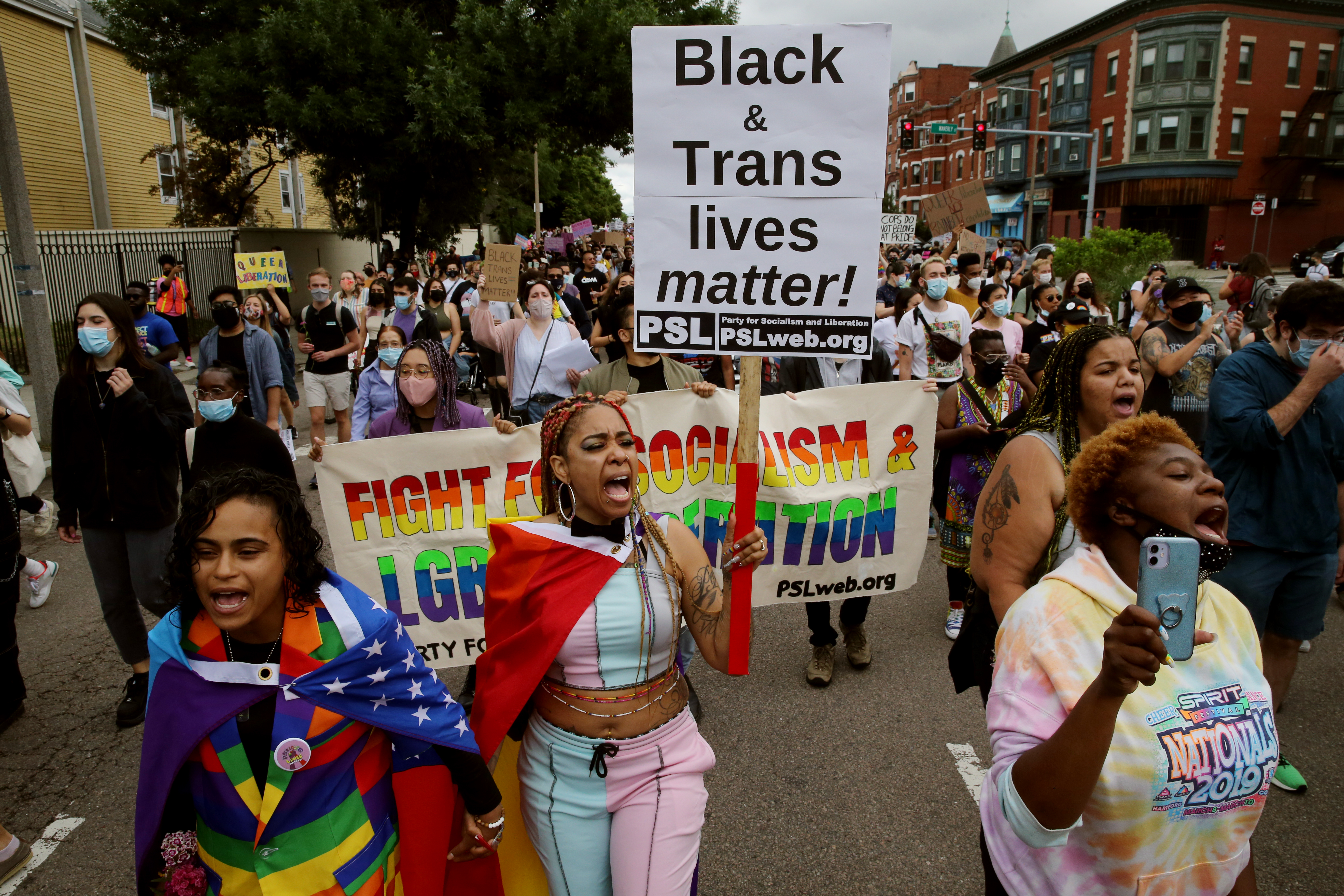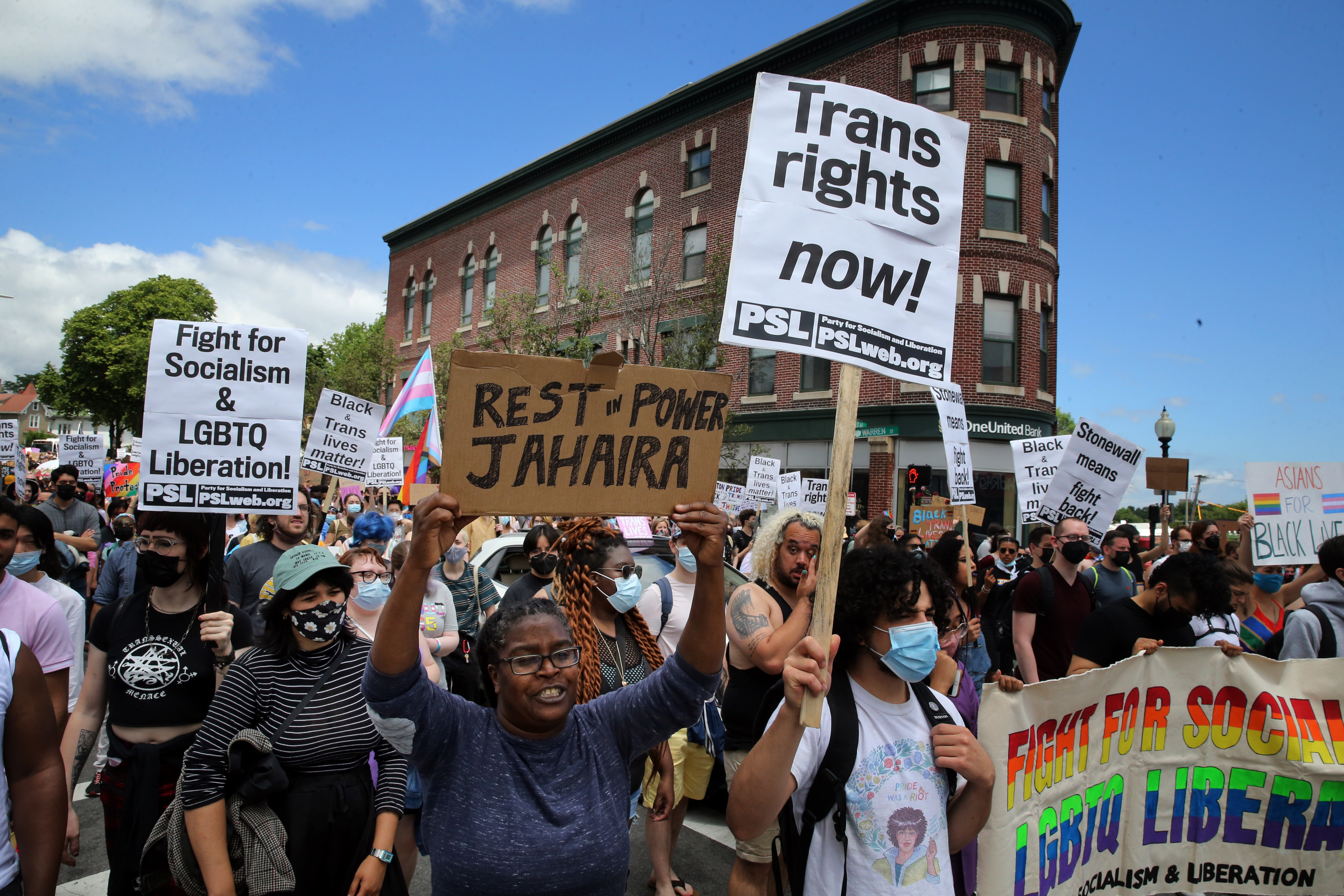Posted By: The Boston Globe | June 12, 2021 | By Laura Crimaldi, Ivy Scott and Felicia Gans

Transgender activists in Boston hosted a large march and rally Saturday, putting a spotlight on Black transgender people and, for the second year in a row, offering an alternative to the city’s longstanding Boston Pride celebration, which critics have called “trans-exclusionary” and said lacks diversity.
The event organized by Trans Resistance MA began Saturday morning in Roxbury’s Nubian Square, where hundreds of marchers gathered and then walked to Franklin Park in Dorchester for a showcase featuring poets, musicians, DJs, dancers, and drag performers.
“We are here to take over these streets because they belong to us,” said Chastity Bowick, executive director of the Transgender Emergency Fund. “Today is our day and nobody else’s. Look around you. This is what community looks like. This is what diversity looks like. This is what inclusion looks like.”
Athena Vaughn, founding director of Trans Resistance MA, also addressed the crowd.
“We’re here, we’re queer, get used to it.” Vaughn said.

Activists in a pickup truck led the procession as music by Whitney Houston, Nicki Minaj, and Megan Thee Stallion blared on loud speakers. Many marchers wore pink and blue, the colors of the transgender pride flag. People also wore the colors of the rainbow, symbolizing the diversity of the LGBTQ community, and clothing supporting the Black Lives Matter movement.
“It is our duty to fight for our freedom. It is our duty to win. We must love and support one another. We have nothing to lose but our chains,” the crowd recited in one chant.
The event unfolded as Trans Resistance MA sees its influence expand, and Boston Pride grapples with a boycott fueled by accusations that the organization is not inclusive.
Jamilynn Armstrong, a transgender activist in Boston, said the city’s traditional LGBTQ celebration “was more about the G than anything else.”
“It felt mainly about gay men,” she said. “We shouldn’t have to have two, but there becomes a need when there’s not representation for us trans folks, or when we only get five minutes on the stage. More trans people can identify with this. It centers them,” she said.
Last week, four groups, including Trans Resistance, staged a successful political power play by persuading every major candidate in the Boston mayoral race to abandon Boston Pride’s scheduled political forum and instead attend theirs. Also last week, Linda DeMarco, the president of Boston Pride, said she plans to step down to make room for new leadership in response to activists who have boycotted the group.
Boston Pride’s reorganization will likely jeopardize the 50th anniversary celebration of Boston Pride, which has already been twice postponed due to the coronavirus and was loosely rescheduled for the fall. Boston Pride, a joyful celebration of LGBTQ identities, has become the largest single-day parade in New England and provides a huge economic boost to Boston.
“I agreed with this trans group that Boston Pride is really gentrified,” said Mary Bahl, a nurse from Lawrence. “We weren’t marching through all parts of Boston, just certain parts and … it seemed not very diverse to me.”
Bahl was holding a sign that read, “Healthcare access for trans people now!!”
“I’ve had trans patients who were kind of shafted by the system before,” she said. “So this issue is really important to me.”
Mayoral hopeful John Barros and Carla Monteiro, who is seeking an at-large seat on the City Council, were among the political candidates who attended.
Barros, the city’s former chief of economic development, said he discussed health care and housing issues facing queer people at the event.
“There’s a part of our community that is not feeling safe, is in fact being targeted, and we need to stand up against that,” he said.
Monteiro said she is concerned about homelessness among transgender youth.
“They are part of our community, and no one should be left out,” she said.
As the marchers made their way through Roxbury and Dorchester, organizers encouraged onlookers to make donations. Outside of Linda’s Hair Braiding, a woman walked into the street and handed Bowick $20.
At one point, Bowick announced that donors had contributed $60,000. Organizers said they want to raise $250,000. Of that sum, $200,000 would go toward buying property to house homeless transgender, non-binary, and gender non-conforming people in Massachusetts, and the rest to pay expenses for Saturday’s event.
Karleigh Webb traveled from Connecticut to participate in the march.
“I’m here because I’m Black, I’m trans, and I’m pissed,” Webb said.
She cited state legislative efforts that would oppress transgender children and adults.
“I’m tired of seeing my Black and brown sisters and brothers with HIV rates five times the national average, with unemployment four times the national average,” Webb said.
At Franklin Park, tents were set up for about a dozen organizations who support the Black and queer community. Fenway Health distributed brochures, informational cards, and stickers with pronouns on them for people to display how they identify at its booth.
“We think it’s important to show up and be here for our community, because this is the community we are designed to serve,” said Steph deNormand, manager of the Trans Health program at Fenway Health. “We know it’s difficult for them to find health care tailored to them so the main goal is to make sure people know that we’re here, and here to care for them.”
At the culmination of the performances, Vaughn announced that acting Mayor Kim Janey had designated Saturday as “Jahaira Balenciaga Day,” in honor of Jahaira DeAlto Balenciaga, a transgender woman and activist who was murdered in Boston last month.
Vaughn read a statement from Janey that described DeAlto Balenciaga as a symbol of love and advocacy.
“Jahaira Balenciaga was a mother to many trans youth many of whom were disowned or shunned by their biological parents,” the statement said.
DeAlto Balenciaga was fatally stabbed May 2 during an attack inside her Dorchester home that also claimed the life of 27-year-old Fatima Yasin, authorities have said. Yasin, her husband, Marcus Chavis, 34, and their two children, had been living with DeAlto Balenciaga. DeAlto Balenciaga’s dog was killed in the attack. Following the killings, police arrested Chavis, who told officers he had been diagnosed with post-traumatic stress disorder and schizophrenia, and charged him with two counts of murder and one count of animal cruelty. He has pleaded not guilty.
As the festivities ended, Bowick addressed the gathering.
“We did it,” Bowick said. “For the second year we took over Boston Pride, so thank you.”

